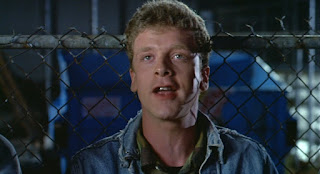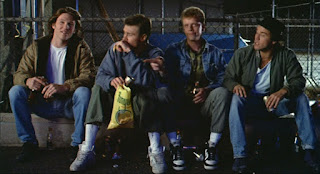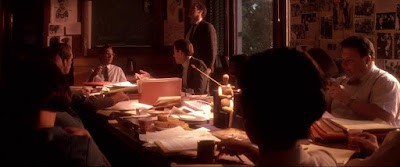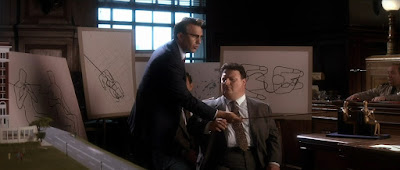Sunday, November 24, 2024
Don't Make a Scene: Say Anything
Saturday, November 23, 2024
JFK
*** Whether Trump will release any more documents in his next term one can only speculate. I don't believe a word the man says so even if he says he will, I'd be looking at updates on the website: https://www.archives.gov/research/jfk
Friday, November 22, 2024
The Big Combo
But, the star of the show is cinematographer John Alton, who worked shadowy wonders for cash-strapped studios like Republic Pictures and eye-popping color scenes for the extravagant M-G-M, and brought rich dark spaces pierced by shimmering light to whatever set-up he touched. Born in Hungary, Alton began his camera work in the silent era and worked all the way up to 1960's Elmer Gantry. He was quick, economical, and created stunning images that arrest the eye and catch the breath. The Big Combo, for all its outlandishness, becomes more centered because of Alton's photography. You take it more seriously and things matter a bit more. Things "hit" harder because of the look of the thing.Since 2007, The Big Combo has been in the public domain and, for that reason, we're featuring it in this post below.
Wednesday, November 20, 2024
The Bedford Incident

The Bedford Incident (James B. Harris, 1965) A veritable volume of Bartlett's Quotations fills my head after seeing The Bedford Incident.
For instance, the astronaut's description of his job as "98% tedium punctuated by moments of sheer terror," and Elwood P. Dowd's "You can be 'oh-so-smart' or 'oh-so-pleasant'—I recommend "pleasant." Then, because the story is basically, "Moby Dick in The Cold War," there are all sorts of Melville quotes...and one bad joke: "Cook 'em, Dan-O."
It's that last one that sticks, though. The Bedford Incident is, basically, a terrible, terrible joke with a possible several mega-tonnage punchline. And director James B. Harris, who, before making this film, was Stanley Kubrick's film-making partner, can't have missed the thought as his ex was making an out-and-out comedy of errors out of the nuclear arms race.
It shows how extreme the measures are on the Bedford, how detail oriented, how precise, how strategic and how puckered the thought processes go into keeping an eye on the enemy. And once found, Finlander will pursue chasing Soviet subs out of territorial waters, even forcing them to stay underwater until they're desperate for air, provoking confrontation. When your Nazi adviser tells you he's scared of your methods, it means you might be going so overboard as to pro-actively lower the life-rafts.
If you're immersed at all in pop-culture, you can see elements of Bedford in such disparate strategy plays as "Star Trek" and The Hunt for Red October. And such gamesmanship is all well and good in limited skirmishes. But, when the arsenal is nuclear? Do you really want a cigarette in a room full of gasoline?
No, and that the game is played despite the mega-stakes makes the movie and its characters seem not just petty, but a little dim for all the talk of brilliance. The point of hubris is well taken, but the point was better made as an out-and-out black comedy about short-term, selfish interests in the face of global catastrophe.





















































